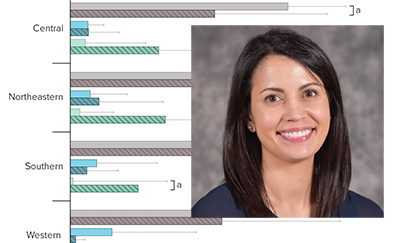 Jennifer Dennis, PhD, MS, KCU-Joplin associate professor of Pathology and Anatomical Sciences, recently co-authored a two-part manuscript series published in Anatomical Sciences Education, an official publication of the American Association for Anatomy. The study, “An Analysis of Anatomy Education Before and During COVID-19”, examined changes in anatomy education that occurred during the pandemic. It is the first data set to be analyzed for how anatomy education changed in response to widespread campus restrictions and social distancing guidelines specific to the United States.
Jennifer Dennis, PhD, MS, KCU-Joplin associate professor of Pathology and Anatomical Sciences, recently co-authored a two-part manuscript series published in Anatomical Sciences Education, an official publication of the American Association for Anatomy. The study, “An Analysis of Anatomy Education Before and During COVID-19”, examined changes in anatomy education that occurred during the pandemic. It is the first data set to be analyzed for how anatomy education changed in response to widespread campus restrictions and social distancing guidelines specific to the United States.
Dennis’s contribution to the study evaluated specific changes in anatomy laboratory formats and practices during both the early (May – August) and late (August – December 2020) stages of the nationwide responses to COVID-19. Overall, data indicated that anatomy education shifted to more remote and asynchronous sessions in the early stages of the pandemic with cadaver use and lab sessions initially decreasing. Part two of the report detailed a return to synchronous, on-campus lab sessions with a reduced number of students to maintain social distancing and increased personal protective equipment requirements. This change in pandemic teaching became key in allowing students to experience and complete dissections while adhering to protocols established by Centers for Disease Control and Prevention.
“This collaboration was a highlight of my experience teaching during the pandemic. Although working remotely at the time, I had direct insight into labs across the United States, to evaluate what procedures other institutions and programs developed to ensure safety while maintaining student engagement and delivering an enriching learning experience,” said Dennis. “I made valuable professional connections during a time of limited contact and created new friendships that remain today. I have incredible anatomy colleagues and I learned a great deal from them through this project. I am very thankful for the opportunity to collaborate with such a talented group.”
Read the full report here.

_20231212142823_0_20231218172027_0.png?w=140&h=140)

(0) Comments